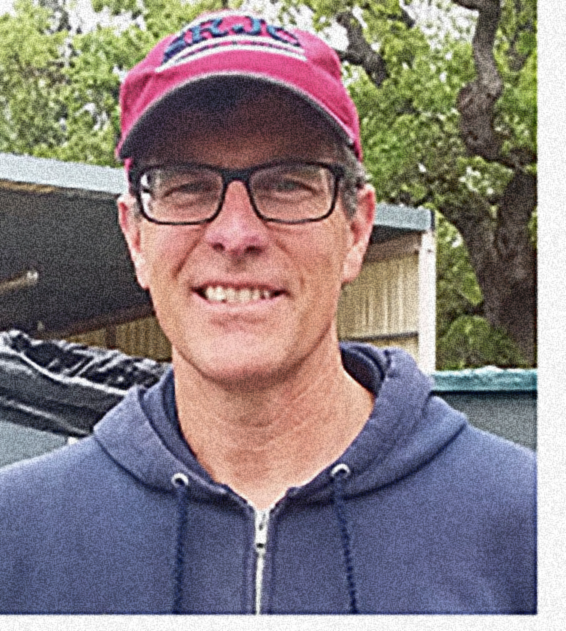For the past four years, Tillotson has been working hard to make SRJC a greener campus.

When a much-needed and appreciated compost bin appeared in our English department workroom, I knew whom to thank. While many of his efforts fly under the radar, Tillotson can be seen around campus daily–wheeling trash cans, emptying water and Gatorade bottles, popping in and out of classrooms to give short but powerful presentations, and helping folks figure out which receptacle is the right one for their trash.
How did you come to be so involved in sustainability at SRJC?
The duties of my job attracted me to apply, as I’ve always found recycling and composting to be an essential, daily way of showing that you care for the environment. Santa Rosa Junior College has the benefit of educated, motivated administrators and dedicated classified staff and faculty who embrace a green culture. I experimented with different ways to increase diversion, including more bins, more signs, more speeches, and eye-catching waste displays. Before I worked here, I was a teacher for 20 years and knew that education could yield results.
What’s the greatest hindrance to reducing waste on campus, and how are you addressing it?
Most assume that my biggest challenge is that people don’t recycle when they could. That is no longer important. Education can only do so much. Even if every JC student and employee knew all about waste, they still would be purchasing items made from the wrong materials. For that reason, city and county ordinances are most effective. Just like with seat-belt laws and smog checks, citizens often learn why a law is important after they have to start following it. By limiting products to compostable or reusable items, each municipality forces stores and restaurants to use and sell the right products and prevent the wrong products (mainly single-use plastics) from flooding the community, the garbage cans, the waterways.
We are addressing this by writing and promoting a “single-use plastics reduction” resolution and working to gain the support of constituency groups in the district. We also have a zero-waste event guide that is distributed to event coordinators.
Explain something that might shock people about the waste stream on campus.
The biggest surprise is the simple fact that single-use paper coffee cups are not recyclable! Then when they learn that 1.5 out of 12 garbage dumpsters a week are filled with those commonly used cups, students and staff often tell me they feel sick to their stomach. My biggest daily shock is when I see a glass bottle or aluminum can in a garbage bin when a recycle bin is inches away. I assumed that everyone learned when they were young how long it takes metal and glass to decompose (and how easy it is to melt those materials down for reuse). Off campus, I am most surprised that our plastics are going all the way to Indonesia, Vietnam, and other distant countries (hardly a “recycling loop”).
What is one single, easy change every person can make to reduce their carbon footprint?
Well honestly, the place to start is dealing with your car’s footprint—but that’s not the answer to the question! Here’s what I suggest: choose one habit to change, then when it becomes easy and natural, move on to the next one.
An order of habits from easy to hard:
1 All food and compostable papers to green bins
2 No plastic bags
3 Limit plastic water bottles
4 Limit single-use coffee cups
5 Bring reusable produce bags into grocery stores
6 Don’t buy any single-use plastics for events/picnics
7 Stop buying single serving food items (pudding cup, etc.)
8 Carry your flatware and straw in your bag (wash them at home)
9 Buy at least 10% of your groceries in bulk
10 Carry clean Tupperware in bag/backpack for taking food to go
Another easy way to change old habits is to subscribe to zero-waste groups and pages on social media so you are receiving a stream of new ideas. I also want to emphasize that you shouldn’t try to be perfect. There are a lot of wound-up people doing zero waste, and provoking guilt only puts people off. Instead, change habits as you can but accept that exceptions will always need to be made!
What exciting innovations in waste reduction are happening at SRJC?
The most important new system is the addition of 20 compost collection bins in and out of buildings. We are continually working with departments to reduce paper waste—something that was once seen as acceptable because it was locally recycled into paper. Now that some goes to landfill and much of it is shipped to Asia, the solution to paper is not recycle it! but stop printing things!
Who inspires you?
Unsurprisingly, Greta Thunberg. Martin Luther King Jr. was also unwavering and willing to demonstrate for a cause. But the need for heroes is much more the common one. We need citizens who can simply tell a barista, “I would love it if your place would stop using plastic,” or tell a city council, “I am here to support any measures that would reduce plastic waste.”
